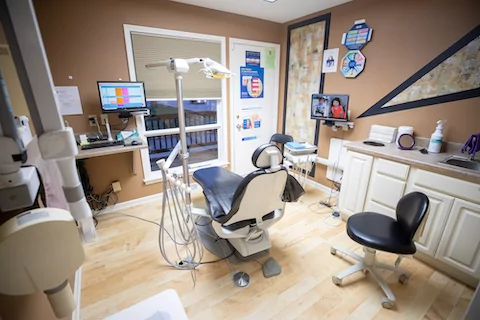Trusted General Dentists in Warsaw
Finding a local dentist who can treat every member of your family is not an easy feat. In fact, the process can be anxiety-inducing. You know that regular visits to your dentist are the best way to protect your teeth and keep those unwanted dental problems at bay—but it doesn’t always seem like the most fun way to spend your free time. Our office wants to change how you look at dental visits!
At Orange Door Dental Group, our number one goal is to create a warm and welcoming environment for you and your family. We believe that visiting the dentist shouldn’t be a traumatizing experience. You should enjoy your visit from the start to the end.
We want to see your smile and to help you keep it as bright and healthy as possible.
Why Should You Choose Orange Door Dental Group?
Individualized Treatment: Our dental practice is dedicated to providing you with quality care and service. We customize your experience to help you feel as comfortable as possible during your visit and to provide the treatment that gives you exactly what you need. As soon as you make that first phone call to our office, you are part of our dental family and we want you to have the best experience possible!
Experience and Knowledge: With over 60 years of combined dentistry experience, Orange Door Dental Group can provide you with the dental care that you expect and deserve. We want to improve your quality of life by helping you to keep your teeth and gums healthy.
Educating Our Patients: We put a major focus on making sure you understand every step of the process. We will educate you on all of our processes and go over your full options for treatment. That way you have all the information you need to make the decisions you may need to make while visiting our offices.
If you are in the Warsaw IN, area, come experience the excellent care and service of our dental team!
What Is General Dentistry and What Can It Do for Me?
When we refer to general dentistry or family dentistry, we are usually talking about general care of your teeth and mouth. General upkeep on your teeth includes routine cleanings, exams, and x-rays. We may also recommend treatments like brush-on fluoride and sealants to help preserve the health of your teeth.
What To Expect During Your General Dentistry Exam
Dental X-Rays
During your exam, we begin with dental imaging. Getting a good picture of your teeth helps us to see what really happening under the surface of your teeth. X-rays will also help us check on the health of the jaw. The use of X-rays helps detect cavities and allows us to catch them in the early stages. This means keeping cavity treatment to a minimum.
With the use of X-rays, we are also able to see if you have any impacted teeth beneath the gums. Impacted teeth can be the cause of some headache symptoms, so removing them could relieve headache pains. Some procedures also allow the impacted teeth to naturally grow from beneath the gums.

Oral Exam
Your dentist will give you a full examination of your teeth and gums. We also examine your cheeks and jaw and look for signs of other issues, including oral cancers. We’ll also check your bite to ensure your teeth are functioning the way they should. If we find any sores or other causes for concern, we can show you the next steps to take to ensure you stay as healthy as possible.
This is also a great time for you to bring up questions or concerns you may have had over the last six months. No question is a bad question. We want you to feel completely on top of your oral health. Your dentist can help answer any questions and give you any suggestions they may have to help improve your oral health routine.
Routine Cleaning
Then comes the fun part. We will then carefully clean your teeth by removing any mineral buildup to help give you a clean slate to work with and polish your teeth to get them back to their regular sparkle. We can top off your visit with a fluoride treatment that will help to improve the health of your teeth and reduce the risk of cavities.
Gum Therapy
When necessary, we also provide gum therapy (also called periodontal treatment) to help combat minor cases of gum disease, called gingivitis, or for more advanced cases of gum disease, called periodontitis. Whatever your case may be, our goal in deep cleaning is to restore your gums to a healthier condition.
Before you go, we’ll discuss more recommended habits and send you away with anything you need to keep your teeth in the best shape possible.
What Issues Can My Local Dentist Help With?
Plaque and Tartar
It’s no secret that everyone has dental plaque. It’s a sticky film that forms on your teeth when bacteria in your mouth mix with sugary or starchy foods. Although tooth brushing and flossing get rid of plaque, if you don’t remove the plaque, it will harden into tartar.
This can lead to gingivitis, tooth loss, and cavities. The plaque can also gather under your gums and attach to the roots of your teeth leading to the breakdown of the bones that support your teeth.
If your teeth feel fuzzy when you run your tongue over them, that’s plaque. You can minimize plaque buildup by brushing and flossing daily, but the only way to completely get rid of it is by seeing your dentist for professional cleanings a couple times a year.
Cavities
Most people have had some sort of run-in with cavities but do you really know what a cavity is? Dental cavities are holes in your teeth that form when acid in your mouth erodes the enamel on your teeth.
Tooth pain is not the only thing you need to worry about. Tooth decay can also affect all layers of a tooth. The decay progress moves quickly through the middle layer to the innermost layer of your tooth. The innermost layer of your tooth contains the nerve endings and blood supply.
Signs you have a cavity: If you have a toothache, bad breath, bleeding gums, or redness around or inside your mouth, you likely have a cavity.
Fillings
Once your dentist locates a cavity, you will most likely need a filling. But what does that really mean? First, your dentist will remove the decay. This will leave a small hole in the tooth that will cause problems unless a filling is placed.
Your filling will prevent bacteria or plaque from building up inside cavities, which could lead to serious infections. This will also help to reinforce the strength of your tooth. That way you don’t have to worry about any further infections or any chipping and cracking.
Gingivitis / Periodontal Disease
Gingivitis, simply put, is gum inflammation. Although most people get gingivitis at some point in their lives, the mild symptoms will make it easy to ignore. Gingivitis can lead to bigger problems, including periodontitis (gum disease), but not all cases will lead to periodontitis. However, it is serious enough that without treatment, can turn into much bigger issues in your mouth.
Signs you have gingivitis: Irritated gums that bleed during tooth brushing, bad breath, receding gums. (Rest assured that at this stage, there will be no irreversible bone or tissue damage, but it’s time to go see your local dentist.)
Toothaches
A toothache can be caused by anything from a piece of food being stuck in your gums to a more serious bacterial infection. Even though some toothaches may come from temporary gum irritation, some may be signs of a serious condition that calls for a dental professional.
Some toothaches can be caused by an abscessed tooth, a damaged filling, repetitive motions, infected gums, a tooth fracture, tooth decay, eruption (teeth coming out of the gums), or removal of a tooth.
Not all toothaches will be able to find relief with at-home remedies. If your toothache is progressing, you should call one of our skilled dentists. Our dental team will do a physical exam to help locate the cause of your toothache.
Mouth Sores
There are many common causes that result in mouth sores. Just a few include:
- Exposure to the herpes simplex virus
- Stress.
- Using tobacco products.
- Irritation from braces or other orthodontic devices.
- Burning your mouth on hot food.
- Hormone changes.
- Brushing your teeth too hard.
- Using a hard-bristled toothbrush.
Although most mouth sores will clear up on their own, if they remain persistent for more than a week, there could be something more serious your dentist can help with.

FAQs for Your Local General Dentist
What’s the best routine for good oral health?
Everyone is different. Depending on your age, diet, and, occupation certain aspects of your oral hygiene will need to be handled differently, as well. However, there are universal aspects of your oral health routine that will always stay the same. For example, daily care, routine professional checkups, cleanings, and a healthy diet.
Here’s a basic routine to help keep your teeth in tip-top shape:
- Brush: We’re talking twice a day. And not just a quick rinse. Focus on brushing your teeth for two minutes (or 30 seconds in each quadrant of your mouth). Make sure to hold your brush at a 45-degree angle to your tooth’s surface.
- Pro tip: If you don’t like brushing your teeth before breakfast, wait at least an hour after eating before brushing your teeth so your saliva can help naturally break down food particles in your mouth.
- Floss: You should be flossing at least once a day.
- Pro tip: The best time to floss is right before bed. You will need about a foot and a half of floss to make sure you have a clean section for each tooth.
- Rinse Your Mouth: After brushing and flossing, it’s time to rinse with mouthwash. Pour a capful and swish it around in your mouth for 30 seconds before spitting it out. This step helps to clear out any leftover toothpaste or food that you missed—not to mention how good it makes your breath smell.
- Regular Checkups: There will always be some problems you can’t see in your bathroom mirror. Make sure to see your local dentist for bi-annual checkups and cleanings.
You will be able to tell if you are doing a good job by the clean and minty feeling in your mouth. Your breath will smell fresh and your teeth will feel super clean (with no fuzzy feeling first thing in the morning). Your gums will have a healthy pink color, rather than being red.
What symptoms should cause concern to see a dentist?
A regular routine and bi-annual cleanings can prevent many issues from occurring, however, consult your dentist if you experience:
- Bleeding gums when you brush or floss.
- An ongoing toothache.
- Red, tender, or swollen gums.
- Loose permanent teeth.
- Gums that have begun to pull away from your teeth.
- Painful chewing.
- Persistent bad breath, or an unusual taste in your mouth.
- Unusual sensitivity to hot and cold.
If there is any sort of pain or suffering, come in to see us. Pain is the body’s way of telling us that something is wrong. Don’t wait until the pain is getting in the way of your ability to perform your everyday functions.
When should you seek help for bad breath?
No one can avoid bad breath for life. Mints can help to mask the bad breath, but if there is something more serious, no mint will be strong enough. Persistent bad breath could be a sign of a more serious condition.
One of the following conditions might be the culprit:
- Gum Disease: Because it can be painless, you may not be able to tell if you have gum disease, so the sooner you can treat it, the better.
- Dry Mouth: Although it’s not a disease, it can be an indicator of a medical condition. So if you find you’re constantly parched, check in with your local dentist.
- Medical Conditions: Bad breath has been associated with bronchitis, diabetes, and other infections or diseases. If your dentist gives you the check of approval for your oral health, they may send you to your physician to be careful.
Even if you are busy, you should find time to keep your dental checkups. Seeing your dentist for an exam twice a month can help to maintain your beautiful smile.
Call Us for All Your Dentistry Needs!
We’d love to see your smile! When you’re ready to take the next step toward great oral health, call Orange Door Dental Group in Warsaw. Our friendly team of dental professionals can’t wait to meet you and welcome you to our dental family.

